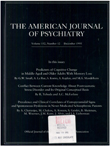Does age make a difference in the effects of physical health and social support on the outcome of a major depressive episode?
Abstract
OBJECTIVE: The authors examined the effects of physical health and social support on 6-month outcome of a major depressive episode in 67 patients who were less than 60 years old and 46 patients who were 60 years old or older. They hypothesized that despite their higher rate of troublesome health problems, older patients would have fewer depressive symptoms at follow-up than would younger patients. METHOD: The Center for Epidemiologic Studies Depression Scale (CES-D Scale) and a modified version of the National Institute of Mental Health Diagnostic Interview Schedule were used to gather data from inpatients and outpatients treated at Duke University Medical Center during a face-to-face interview at baseline and over the telephone at 6-month follow-up. At baseline, all patients met DSM-III-R criteria for a major depressive episode. Data analyses included bivariate and multivariate procedures. RESULTS: At baseline, the mean CES-D Scale scores of the two age groups were similar. As expected, the mean illness index score of the older patients was significantly higher and their mean impaired subjective social support score was slightly lower than those of the younger patients. At 6-month follow-up, the mean CES-D Scale score of the younger patients was above the depressive threshold, but the mean CES-D Scale score of the older patients was below the depressive threshold. The illness index and impaired subjective support measures were significant predictors of depressive symptoms at 6 months for the younger patients but not for the older patients. CONCLUSIONS: The authors conclude that older depressed patients have a more favorable prognosis than younger depressed patients. Predictors of outcome vary by age.
Access content
To read the fulltext, please use one of the options below to sign in or purchase access.- Personal login
- Institutional Login
- Sign in via OpenAthens
- Register for access
-
Please login/register if you wish to pair your device and check access availability.
Not a subscriber?
PsychiatryOnline subscription options offer access to the DSM-5 library, books, journals, CME, and patient resources. This all-in-one virtual library provides psychiatrists and mental health professionals with key resources for diagnosis, treatment, research, and professional development.
Need more help? PsychiatryOnline Customer Service may be reached by emailing [email protected] or by calling 800-368-5777 (in the U.S.) or 703-907-7322 (outside the U.S.).



